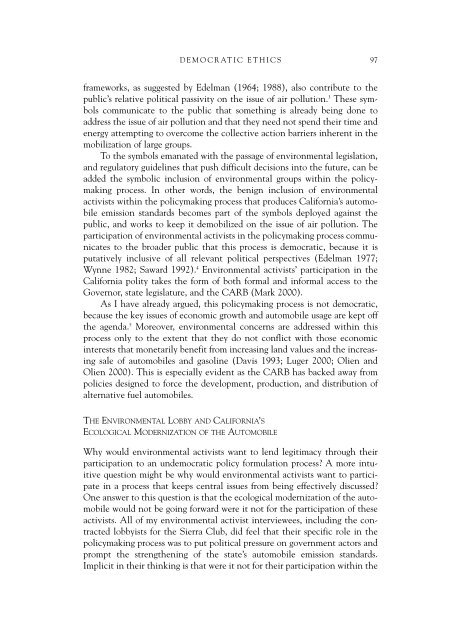GEORGE A. GONZALEZ - fieldi
GEORGE A. GONZALEZ - fieldi
GEORGE A. GONZALEZ - fieldi
You also want an ePaper? Increase the reach of your titles
YUMPU automatically turns print PDFs into web optimized ePapers that Google loves.
DEMOCRATIC ETHICS 97frameworks, as suggested by Edelman (1964; 1988), also contribute to thepublic’s relative political passivity on the issue of air pollution. 3 These symbolscommunicate to the public that something is already being done toaddress the issue of air pollution and that they need not spend their time andenergy attempting to overcome the collective action barriers inherent in themobilization of large groups.To the symbols emanated with the passage of environmental legislation,and regulatory guidelines that push difficult decisions into the future, can beadded the symbolic inclusion of environmental groups within the policymakingprocess. In other words, the benign inclusion of environmentalactivists within the policymaking process that produces California’s automobileemission standards becomes part of the symbols deployed against thepublic, and works to keep it demobilized on the issue of air pollution. Theparticipation of environmental activists in the policymaking process communicatesto the broader public that this process is democratic, because it isputatively inclusive of all relevant political perspectives (Edelman 1977;Wynne 1982; Saward 1992). 4 Environmental activists’ participation in theCalifornia polity takes the form of both formal and informal access to theGovernor, state legislature, and the CARB (Mark 2000).As I have already argued, this policymaking process is not democratic,because the key issues of economic growth and automobile usage are kept offthe agenda. 5 Moreover, environmental concerns are addressed within thisprocess only to the extent that they do not conflict with those economicinterests that monetarily benefit from increasing land values and the increasingsale of automobiles and gasoline (Davis 1993; Luger 2000; Olien andOlien 2000). This is especially evident as the CARB has backed away frompolicies designed to force the development, production, and distribution ofalternative fuel automobiles.THE ENVIRONMENTAL LOBBY AND CALIFORNIA’SECOLOGICAL MODERNIZATION OF THE AUTOMOBILEWhy would environmental activists want to lend legitimacy through theirparticipation to an undemocratic policy formulation process? A more intuitivequestion might be why would environmental activists want to participatein a process that keeps central issues from being effectively discussed?One answer to this question is that the ecological modernization of the automobilewould not be going forward were it not for the participation of theseactivists. All of my environmental activist interviewees, including the contractedlobbyists for the Sierra Club, did feel that their specific role in thepolicymaking process was to put political pressure on government actors andprompt the strengthening of the state’s automobile emission standards.Implicit in their thinking is that were it not for their participation within the









